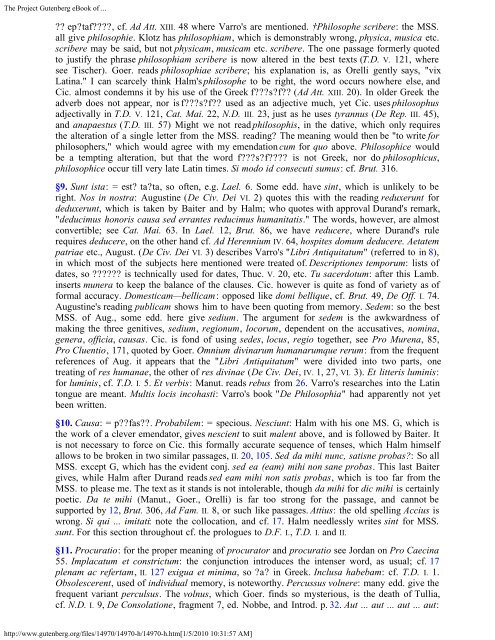academica of cicero. - 912 Freedom Library
academica of cicero. - 912 Freedom Library
academica of cicero. - 912 Freedom Library
Create successful ePaper yourself
Turn your PDF publications into a flip-book with our unique Google optimized e-Paper software.
The Project Gutenberg eBook <strong>of</strong> ...<br />
?? ep?taf????, cf. Ad Att. XIII. 48 where Varro's are mentioned. †Philosophe scribere: the MSS.<br />
all give philosophie. Klotz has philosophiam, which is demonstrably wrong, physica, musica etc.<br />
scribere may be said, but not physicam, musicam etc. scribere. The one passage formerly quoted<br />
to justify the phrase philosophiam scribere is now altered in the best texts (T.D. V. 121, where<br />
see Tischer). Goer. reads philosophiae scribere; his explanation is, as Orelli gently says, "vix<br />
Latina." I can scarcely think Halm's philosophe to be right, the word occurs nowhere else, and<br />
Cic. almost condemns it by his use <strong>of</strong> the Greek f???s?f?? (Ad Att. XIII. 20). In older Greek the<br />
adverb does not appear, nor is f???s?f?? used as an adjective much, yet Cic. uses philosophus<br />
adjectivally in T.D. V. 121, Cat. Mai. 22, N.D. III. 23, just as he uses tyrannus (De Rep. III. 45),<br />
and anapaestus (T.D. III. 57) Might we not read philosophis, in the dative, which only requires<br />
the alteration <strong>of</strong> a single letter from the MSS. reading? The meaning would then be "to write for<br />
philosophers," which would agree with my emendation cum for quo above. Philosophice would<br />
be a tempting alteration, but that the word f???s?f???? is not Greek, nor do philosophicus,<br />
philosophice occur till very late Latin times. Si modo id consecuti sumus: cf. Brut. 316.<br />
§9. Sunt ista: = est? ta?ta, so <strong>of</strong>ten, e.g. Lael. 6. Some edd. have sint, which is unlikely to be<br />
right. Nos in nostra: Augustine (De Civ. Dei VI. 2) quotes this with the reading reduxerunt for<br />
deduxerunt, which is taken by Baiter and by Halm; who quotes with approval Durand's remark,<br />
"deducimus honoris causa sed errantes reducimus humanitatis." The words, however, are almost<br />
convertible; see Cat. Mai. 63. In Lael. 12, Brut. 86, we have reducere, where Durand's rule<br />
requires deducere, on the other hand cf. Ad Herennium IV. 64, hospites domum deducere. Aetatem<br />
patriae etc., August. (De Civ. Dei VI. 3) describes Varro's "Libri Antiquitatum" (referred to in 8),<br />
in which most <strong>of</strong> the subjects here mentioned were treated <strong>of</strong>. Descriptiones temporum: lists <strong>of</strong><br />
dates, so ?????? is technically used for dates, Thuc. V. 20, etc. Tu sacerdotum: after this Lamb.<br />
inserts munera to keep the balance <strong>of</strong> the clauses. Cic. however is quite as fond <strong>of</strong> variety as <strong>of</strong><br />
formal accuracy. Domesticam—bellicam: opposed like domi bellique, cf. Brut. 49, De Off. I. 74.<br />
Augustine's reading publicam shows him to have been quoting from memory. Sedem: so the best<br />
MSS. <strong>of</strong> Aug., some edd. here give sedium. The argument for sedem is the awkwardness <strong>of</strong><br />
making the three genitives, sedium, regionum, locorum, dependent on the accusatives, nomina,<br />
genera, <strong>of</strong>ficia, causas. Cic. is fond <strong>of</strong> using sedes, locus, regio together, see Pro Murena, 85,<br />
Pro Cluentio, 171, quoted by Goer. Omnium divinarum humanarumque rerum: from the frequent<br />
references <strong>of</strong> Aug. it appears that the "Libri Antiquitatum" were divided into two parts, one<br />
treating <strong>of</strong> res humanae, the other <strong>of</strong> res divinae (De Civ. Dei, IV. 1, 27, VI. 3). Et litteris luminis:<br />
for luminis, cf. T.D. I. 5. Et verbis: Manut. reads rebus from 26. Varro's researches into the Latin<br />
tongue are meant. Multis locis incohasti: Varro's book "De Philosophia" had apparently not yet<br />
been written.<br />
§10. Causa: = p??fas??. Probabilem: = specious. Nesciunt: Halm with his one MS. G, which is<br />
the work <strong>of</strong> a clever emendator, gives nescient to suit malent above, and is followed by Baiter. It<br />
is not necessary to force on Cic. this formally accurate sequence <strong>of</strong> tenses, which Halm himself<br />
allows to be broken in two similar passages, II. 20, 105. Sed da mihi nunc, satisne probas?: So all<br />
MSS. except G, which has the evident conj. sed ea (eam) mihi non sane probas. This last Baiter<br />
gives, while Halm after Durand reads sed eam mihi non satis probas, which is too far from the<br />
MSS. to please me. The text as it stands is not intolerable, though da mihi for dic mihi is certainly<br />
poetic. Da te mihi (Manut., Goer., Orelli) is far too strong for the passage, and cannot be<br />
supported by 12, Brut. 306, Ad Fam. II. 8, or such like passages. Attius: the old spelling Accius is<br />
wrong. Si qui ... imitati: note the collocation, and cf. 17. Halm needlessly writes sint for MSS.<br />
sunt. For this section throughout cf. the prologues to D.F. I., T.D. I. and II.<br />
§11. Procuratio: for the proper meaning <strong>of</strong> procurator and procuratio see Jordan on Pro Caecina<br />
55. Implacatum et constrictum: the conjunction introduces the intenser word, as usual; cf. 17<br />
plenam ac refertam, II. 127 exigua et minima, so ?a? in Greek. Inclusa habebam: cf. T.D. I. 1.<br />
Obsolescerent, used <strong>of</strong> individual memory, is noteworthy. Percussus volnere: many edd. give the<br />
frequent variant perculsus. The volnus, which Goer. finds so mysterious, is the death <strong>of</strong> Tullia,<br />
cf. N.D. I. 9, De Consolatione, fragment 7, ed. Nobbe, and Introd. p. 32. Aut ... aut ... aut ... aut:<br />
http://www.gutenberg.org/files/14970/14970-h/14970-h.htm[1/5/2010 10:31:57 AM]















